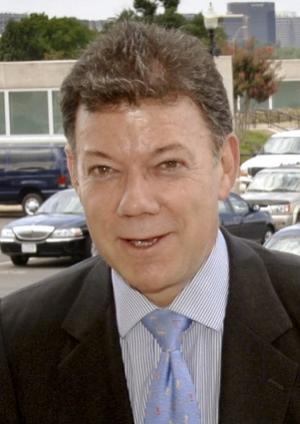Consequences of Prohibition
Politics & Advocacy
In an interview with the magazine Semana published Sunday, Conservative Colombian President Juan Manuel Santos said he was open to decriminalizing drug possession. Drug possession had been decriminalized in Colombia from the early 1990s until 2009, when, after years of effort, then President Alvaro Uribe managed to push through re-criminalization.

Juan Manuel Santos (wikimedia.org)
Colombia is one of the world's leading coca and cocaine producers. Leftist guerrillas and rightist paramilitaries have both profited from the trade, as have non-political criminal elements.
"President Santos's cautious but clear support for seriously debating the option of legalization as a solution to prohibition-related violence and crime sends an important message to other presidents and prime ministers," said Drug Policy Alliance executive director Ethan Nadelmann in a statement Monday. "Taken together with President Obama's recent acknowledgement that legalization is a legitimate topic for debate, it suggests that the debate is opening up globally in ways that are both unprecedented and essential to meaningful drug policy reform."
Santos also signaled support for Bolivia's efforts to have coca removed from the 1961 Single Convention on Narcotics list of controlled substances. That request is before the United Nations right now and has been challenged by the US and a number of European countries.
"I am open to discussing new alternatives, but we cannot make the change alone," he said. "And we have no alternative to fighting the chain of drug trafficking. We support Bolivia because this is established in the constitution: respect the indigenous peoples and their traditions."
Santos' remarks on decriminalization come as Colombia's Constitutional Court hears a challenge to the 2009 re-criminalization law. The International Center on Human Rights and Drug Policy last week submitted an amicus brief to the court arguing that decriminalization is not prohibited by the UN anti-drug conventions or the UN Convention on the Rights of the Child.
This work by StoptheDrugWar.org is licensed under Creative Commons Attribution-ShareAlike 4.0 International
Comments
really???
saludos desde colombia de parte de un colectivo de activistas antirpohibicionistas.
se considera que santos muestra una faceta hacia afuera del pais y otra hacia dentro. No es verdad que quiera cambiar las politicas sobre drogas, no es verdad que quiera enmendar el retroceso politico que genero alvaro uribe...no hay espacio ni dialogo, miles de portadores y productores de drogas caen en carcel todos lo dias...
no sabemos que paso en su reporte pero la verdad es que demuestra que necesitan periodistas de base en este pais. (por ahi hay muchos amarillistas).
se cuidan
lucas
its the money stupido
There is big money being spent to keep drugs illegal. I believe the U.S. gov. needs a war on drugs to have a excuse to search our homes and our cars to put one in 100 in jail or prison and to fight the people who know they are being lied to. The people who see clearly that the whole system is full of corruption and there is no solution except honesty. We are doomed!
Fantastic news...
It's great to see some common sense from a world leader for once. Pressure seems to be mounting for blanket legalisation, but we need the UN to take the proper steps before any country will take the plunge. No one single country can do this on its own - it has to be a joint decision between the main world powers.
There is so much more to think about than simply saying 'Everything is legal from tomorrow'. A proper infrastructure needs to be established for production and distribution, otherwise the illegal element will continue to keep a stranglehold on things.
Imagine a world where we no longer have 'drug barons' or millions of people needlessly in prison? Imagine a world where all drugs profits are taxed and that money is put to good use? With things as they are we are gifting billions of dollars to hardened criminal gangs and terrorists, which causes further misery.
If governments were to legalise and, more importantly, CONTROL drug distribution, we could mush more effectively help if people start to have a problem. Lets not forget that a good proportion of drug use is by normal, everyday, taxpaying people who quite happily hold down normal jobs and don't end up in rehab. These people are RECREATIONAL users, not addicts - there is a BIG difference!
I don't think we'd see much of a rise in drug use if we were to legalise... though we would see LESS deaths from it! Deaths from using heroin are predominately from contaminated drugs and/or needles. Another problem with heroin is that currently most of the production happens in Afghanistan, where the Taliban apparently raise 60% of their funding through selling the drugs to western gangs.... where is the sense in letting this continue?!?!? Just buy the whole crop!!! The farmers would be happy, we'd destroy the Taliban and the drugs could be given away to users, so then they wouldn't have to steal from people to fund their habit!!!!
The bottom-line is that we cannot continue with things as they are. People are needlessly dying and lives are being ruined by incarceration, while some unscrupulous people in power earn millions from their misery. The sooner something is done the sooner the world will be a much better place!
Add new comment